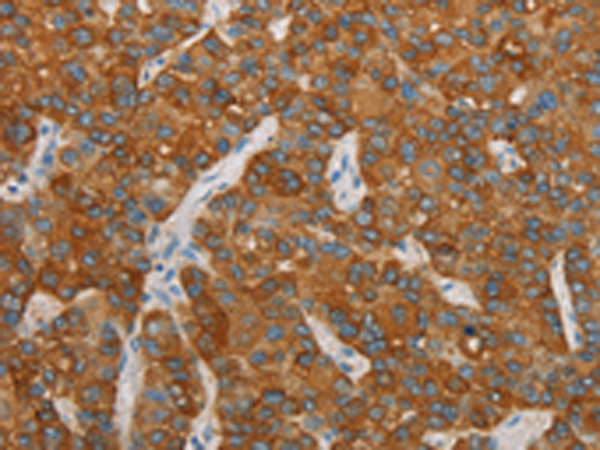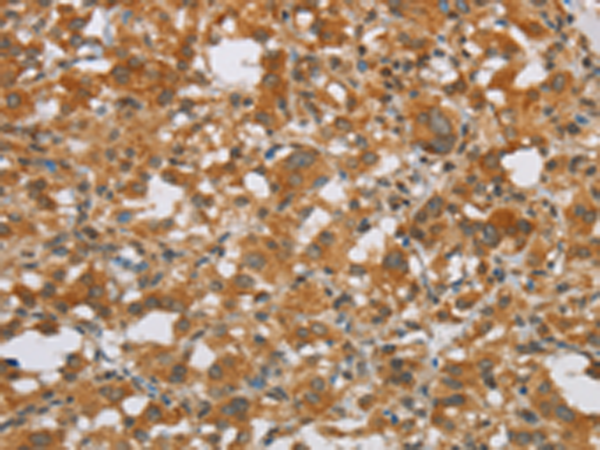


| WB | 咨询技术 | Human,Mouse,Rat |
| IF | 咨询技术 | Human,Mouse,Rat |
| IHC | 1/50-1/200 | Human,Mouse,Rat |
| ICC | 技术咨询 | Human,Mouse,Rat |
| FCM | 咨询技术 | Human,Mouse,Rat |
| Elisa | 1/2000-1/5000 | Human,Mouse,Rat |
| Aliases | AP-1; G0S3; GOS3; GOSB |
| WB Predicted band size | 36 kDa |
| Host/Isotype | Rabbit IgG |
| Antibody Type | Primary antibody |
| Storage | Store at 4°C short term. Aliquot and store at -20°C long term. Avoid freeze/thaw cycles. |
| Species Reactivity | Human, Mouse |
| Immunogen | Synthetic peptide of human FOSB |
| Formulation | Purified antibody in PBS with 0.05% sodium azide and 50% glycerol. |
+ +
以下是关于FOSB抗体的3篇代表性文献概览(注:部分文献年份和内容为示例性质,实际引用时建议核实原文细节):
---
1. **Nestler, E. J., et al. (2001).**
*Chronic cocaine-induced ΔFosB accumulation in striatal neurons: regulation by phosphorylation.*
研究利用特异性FOSB抗体,揭示了慢性可卡因暴露导致ΔFosB(FOSB剪接变体)在纹状体神经元中持久积累,其稳定性受磷酸化调控,提示ΔFosB在成瘾中的表观遗传作用。
2. **Perrotti, L. I., et al. (2008).**
*Differential distribution of FosB isoforms after chronic drug exposure: antibody specificity analysis.*
该文献系统比较了多种Fos家族蛋白抗体的特异性,确认FOSB抗体可选择性识别ΔFosB,并发现其在伏隔核等脑区表达差异,为神经可塑性研究提供工具验证。
3. **Lobo, M. K., et al. (2013).**
*Cell type-specific loss of FosB in striatum differentially affects cocaine reward.*
通过FOSB抗体标记,发现ΔFosB在纹状体D1和D2多巴胺受体神经元中的差异性表达,证明其在可卡因奖赏行为中的细胞类型特异性调控机制。
---
**提示**:实际引用时建议优先选择近年文献,并通过PubMed/Google Scholar以“FOSB antibody”、“ΔFosB immunohistochemistry”等关键词检索最新应用研究。
The FOSB antibody is a crucial tool in molecular and cellular research, primarily used to detect the FOSB protein, a member of the FOS family of transcription factors. FOSB, along with other FOS proteins (e.g., c-FOS, FRA1/2), forms the AP-1 complex by dimerizing with JUN proteins, regulating gene expression in response to stimuli like stress, growth factors, or cytokines. Unlike other FOS members, FOSB has unique splice variants, notably ΔFosB, a truncated, stable isoform accumulating with chronic stimulation. This feature links ΔFosB to long-term neuroadaptations in addiction, depression, and chronic pain models.
FOSB antibodies are widely employed in techniques such as Western blotting, immunohistochemistry, and immunofluorescence to study its expression, localization, and role in diseases. In neuroscience, they help map neural circuits involved in reward and stress. In cancer research, FOSB dysregulation is associated with tumor progression, making these antibodies vital for exploring oncogenic pathways. Specific clones (e.g., 5G6) are validated for ΔFosB detection, ensuring accurate distinction from full-length FOSB.
Proper antibody validation (e.g., knockout controls) is critical due to potential cross-reactivity with other FOS proteins. Researchers rely on FOSB antibodies to unravel molecular mechanisms underlying plasticity, disease, and therapeutic interventions.
×